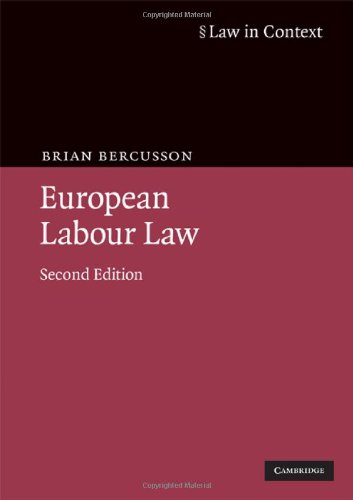

Most ebook files are in PDF format, so you can easily read them using various software such as Foxit Reader or directly on the Google Chrome browser.
Some ebook files are released by publishers in other formats such as .awz, .mobi, .epub, .fb2, etc. You may need to install specific software to read these formats on mobile/PC, such as Calibre.
Please read the tutorial at this link. https://ebooknice.com/page/post?id=faq
We offer FREE conversion to the popular formats you request; however, this may take some time. Therefore, right after payment, please email us, and we will try to provide the service as quickly as possible.
For some exceptional file formats or broken links (if any), please refrain from opening any disputes. Instead, email us first, and we will try to assist within a maximum of 6 hours.
EbookNice Team

Status:
Available4.6
20 reviews
ISBN 10: 0521613507
ISBN 13: 9780521613507
Author: Brian Bercusson
European Labour Law explores how individual European national legal systems, in symbiosis with the European Union, produce a transnational labour law system that is distinct and genuinely European in character. Professor Brian Bercusson describes the evolution of this system, its national, transnational and global contexts and its institutional and substantive structures. The collective industrial-relations dimension of employment is examined, and the labour law of the EU as manifested in, for example, European works councils is analysed. Important subjects which have traditionally received little attention in some European labour law systems are covered, for example, the fragmentation of the workforce into atypical forms of employment. Attention is also given to the enforcement of European labour law through administrative or judicial mechanisms and the European social dialogue at intersectoral and sectoral levels. This new edition has been extensively updated, as the EU's influence on this area of social policy continues to grow.
PART I
1 A brief history of labour law
Collective laissez-faire – the 1950s
The demise of collective laissez-faire - the 1960s and 1970s
Promoting workers' rights
Managing the economy
Reducing the number of strikes
Individualism and deregulation - the 1980s and early 1990s
Protecting workers' rights: individualism
Tackling strikes
Reducing burdens on business
Promoting workers' rights: EC law
Conclusion
'The third way' - 1997 to the present
Studying labour law today
Further reading
2 Economics perspectives on labour law
What do economists do?
Microeconomics
Markets
Labour markets
Labour law: two schools of thought
Neoclassical economics
New institutional economics
Macroeconomics
Productivity
Unemployment
The role of economics perspectives
Further reading
3 Human rights perspectives on labour law
A brief overview of human rights
Historical development
Types of rights
Civil and political rights
Economic and social rights
International human rights instruments and domestic law
Interpreting rights
Right-holders
Rights against whom?
Scope
Weight
Further reading
4 Modes of regulation
International and regional regulation
The International Labour Organization
The European Social Charter
The European Convention on Human Rights
The European Union
What role for national law?
Modes of regulation within national law
Further reading
PART II
5 Who is protected by employment law?
Typical and atypical workers Economics perspectives
Rights perspectives
The scope of employment law
Employees
Workers
Self-employed people
Why does it matter?
Atypical workers have other problems too
The scope of employment law - an issue to remember
Further reading
6 Working time
Economics perspectives
The working week
Leave
Rights perspectives
Hours and holidays
Leave
The law on working time
Rules applicable to all
Rules applicable to workers with family responsibilities
Further reading
7 Discrimination
Economics perspectives
Arguments against legal intervention
Arguments which might support legal intervention
Rights perspectives
Who is protected?
What constitutes discrimination?
Can discrimination ever be justified?
English law
Who is protected?
What constitutes discrimination?
Can discrimination ever be justified?
8 Further reading
Wages
Economics perspectives
Minimum wages
Equal pay
Rights perspectives
Minimum wages
Equal pay
English law
The national minimum wage
Entitlement and enforcement
The rate
Equal pay
Eligibility and enforcement
Employers' defences
Further reading
9 Dismissal
Economics perspectives
Arguments against regulation
Arguments in favour of regulation
Rights perspectives
English law
Eligibility to claim
Controls over the employer's reason for dismissal
Controls over the employer's procedures
Remedies
Further reading
10 Collective representation
Rights perspectives
Collective bargaining
Consultation
Economics perspectives
Economic arguments against worker participation
Economic arguments in favour of worker participation
The law on collective bargaining
The law on consultation
Further reading
11 Trade union membership
Rights perspectives
Freedom of association and employers
Freedom of association and unions
Can an individual be compelled to join a union?
Can unions set their own membership criteria?
Can unions compel their members to participate in union
activities?
Economics perspectives
Freedom of association as against employers
Discrimination against trade unionists
Access to employment
During employment
Dismissal
Duties to support union activities
Freedom of association between workers and trade unions
Compulsory trade union membership
Trade union rules on membership
Union discipline and expulsion
Further reading
12 Industrial action
Rights perspectives
Economics perspectives
The law on trade unions and strike organisers
The law on individual strikers
Further reading
What next?
The economic and social context
The international dimension
The EU
The UK
The perspectives revisited
Index
european labour law
international and european labour law
comparative and european labour law
bercusson european labour law
international and european labour law a commentary
Tags: Brian Bercusson, European Labour Law